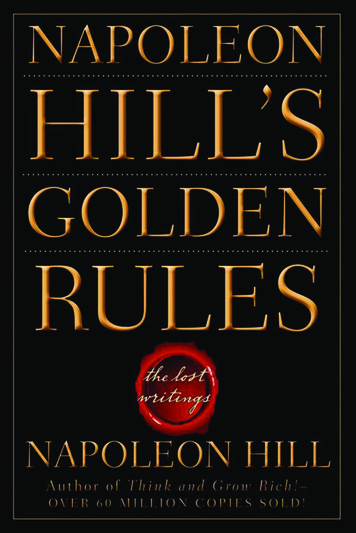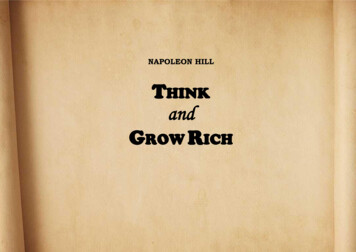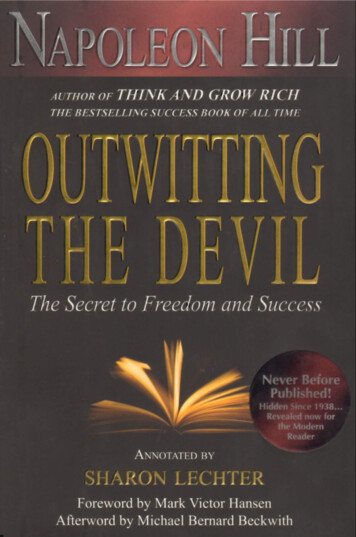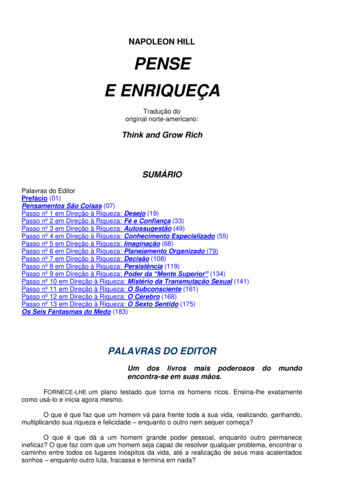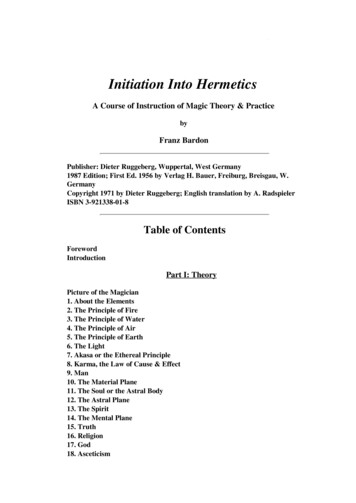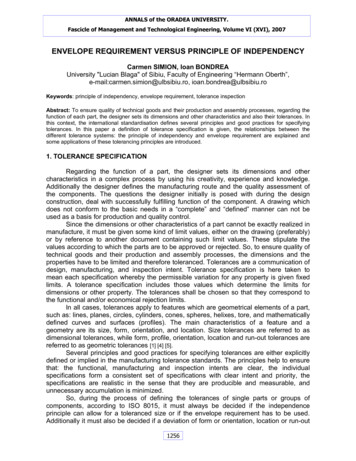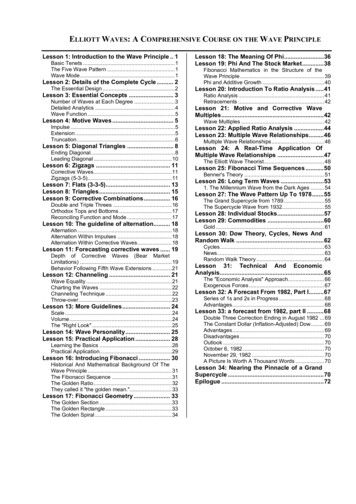
Transcription
NAPOLEON HILLPrinciple 1: Definite Major PurposeThe Value of GoalsHis success has come from setting them, reaching them and setting them again.Bill Lee is a handsome, personable, energetic man of 48 who set his goal to be worth a million dollars by age 40. Heachieved his goal at 39. Today he is rich by most people's standards. And he has good things to say about money.The thing that's beautiful about wealth is that it offers you so many more options in life," he says. "If you'regenerous, you can be more so. If you have strong social values, you can support projects that help other peopleand your community."He believes that almost anyone can stop being a "slave" and can gain financial independence by learning to setgoals. As a management consultant and teacher extraordinaire, he emphasizes this point in seminars andconferences all over the country, as well as in his national newsletter for the builders supply industry, People andProfit .Lee, a Georgia native, graduated from Emory University in Atlanta with a degree in psychology. He got a taste forteaching entrepreneurship on his first job out of college, working for Atlanta Newspapers, Inc.His office taught young carriers the principles of free enterprise and trained them to keep their buying, selling andcollecting records accurately and to deliver the best possible service to the customers of the Atlanta Journal.Looking for Success:Also during that time he was introduced by a friend to a dynamic seminar speaker who stressed the power ofsetting goals for success in life."I couldn't sleep all night after attending that seminar," Lee says. His mind was opened to the possibilities ofincreasing his own productivity and income, and soon he had moved to another company, one where he couldwork on commission.Bill Lee had had a truck-driving acquaintance with his father's hardware and building supply company as he wasgrowing up, but the new company he joined, GAF Corp., was his real career introduction to the building supplyindustry.The GAF job began for Lee a long term relationship with the people who own, manage and work in that industry.And he found a special love-with the Smaller, independent supply houses which continues today.Lee recalls that GAF didn't offer their salespeople training at that time, other than to show them the products andprices, so he read everything he could find-Napoleon Hill and others-that would help him succeed in his new sellingposition.He moved from Mobile, Ala., to Baltimore, doubling his income as he moved, and then back South again tobecome sales manager of the company's Savannah (Ga.) district.
One of his best customers was a young company called Builder Marts, based in Greenville, S.C. He and GAF hadgiven them superb service, and the president asked if he'd be interested in buying into the newly-formedcompany.Lee jumped at the chance and calls Clarence Bauknight, Builder Marts founder, an extraordinary influence on hiscareer."He was brilliant at goal setting," Lee says, (and he let every one of us know what the carrot looked like. Workingwith him was like getting a Ph.D. in finance."Bauknight used the team approach and understood the power of the reward system. When the company did well,everybody did. The pay of all his corporate officers was based on the same numbers.Builder Marts in those early days added value to their products by providing seminars to teach their customershow to be better business people and to teach small independent building supply dealers how to compete withthe national chains.Teaching OthersThe company began growing rapidly, and by 1986, when Lee left to pursue his own private consulting goals, saleshad reached 650 million.Since leaving Builder Marts to form his own company, Lee Resources, Inc., Bill Lee has concentrated on teachingother people to do the things he's learned will work through the years.His company teaches sales and management seminars, offers management consulting and develops highly creativetraining and educational materials.Lee says he was influenced by Napoleon Hill's searching out "keys" and "clues" to success through his interviewswith successful men."It motivated me to start looking for that kind of thing in my own work," he says. Now he shares what he haslearned with his clients.One of his favorite experiences is getting 30 people in a room and talking with them about taking care of theircustomers. He thinks the pendulum has swung as far as it can in the wrong direction when it comes to servingcustomers, and now it's coming back.He believes customer satisfaction is highly measurable. During his 18 years with Builder Marts, five of which werespent in the computer division, he fell under the spell of measuring progress of all kinds.Some people talk of "intangibles." Lee believes almost everything positive can and ought to be counted andrewarded. In his seminars he teaches managers that it's possible to quantify the "right" employee behavior -- thekind you want to see more often in your place of business -- such as: A salesperson calling a customer by name Suggestions for complementary products -- "We have your paint. Do you need brushes, rollers, dropcloths, or a ladder?" -- that decrease the number of one-item tickets Walking, not pointing, a customer to a product he or she can't locate in the store Sensitivity to a customer's feelings about smoking and other personal habits
It's hard for employees to exhibit "right" behavior, though, if managers don't let them know what they expect fromthem. Too many employees, he says, don't know what to do to get a feather in their caps.He tells managers to "Tell your people what you expect. Then Inspect what you Expect-and celebrate togetherwhen things go right . When you meet your goals, give out bonuses or throw a party."(Rewarding "right" behavior is another area where Lee follows Napoleon Hill's precepts. Another method hesuggests to managers is using a "token" system for rewarding effective employees. They can earn a half day ormore off, or a cash bonus, by collecting enough of them.)Lee's firm gives managers who attend its seminars an unusual opportunity to hear what their customers think ofthe service they get in their stores. After the seminar, Lee will contract with a third party firm to interview acompany's customers and ask them to rate the service they received on their last visit and tell why they rated it.Lee says follow-up by the managers themselves is essential when they attend seminars."In the seminar itself, a leader can take students from ignorance to knowledge. But they've got to take it fromknowledge to practice and from practice to habit."Lee's interest in the conceptual part of selling and the validity of setting goals, meeting them and then setting newones hasn't dimmed through the years. And his belief that you can make a million-or two or three-if you set that asyour goal is as strong as ever.Copyright Napoleon Hill Foundation
Principle 2: Mastermind AllianceA mastermind alliance involves two or more people who work in perfect harmony for the attainment of a definitepurpose. Through a mastermind alliance you: May borrow and use the education, experience, influence, and the capital of other people. Can accomplish in one year more than you could accomplish without it in a lifetime. Can draw freely upon the spiritual forces within you. Can have absolute protection against failure if your purpose is beneficial to all whom you influence.Napoleon Hill Revisited: On The Master Mind Alliance A Master Mind may be developed by a friendly alliance, in a spirit of harmony of purpose, between two ormore minds. No two minds ever met without creating, as a result of the contact, another mind whichaffects all participating in the alliance. This principle is analogous to chemistry. For example, the chemical formula H2O (combining two atoms ofhydrogen with one atom of oxygen) changes these two elements to water. One atom of each of theseelements will not produce water; moreover, they cannot even be made to associate themselves inharmony. Just as combining certain elements changes their nature, the combining of certain minds changes thenature of those minds, producing either a certain degree of a Master Mind or its highly destructiveopposite. Very simply, a Master Mind may be defined as the invisible power that results when two ormore minds work in perfect harmony toward achieving a common goal. The ability to organize people in strategic positions in a spirit of friendliness and harmony was the mainsource of both the power and the fortune accumulated by the late Andrew Carnegie. Knowing nothing ofthe technical end of the steel business, Carnegie combined and grouped the key executives of which hisMaster Mind was composed, so that in his lifetime he built the most successful steel industry the worldhad known. Henry Ford's gigantic success may be traced to the application of this same principle. Ford was extremelyself-reliant, but he did not depend upon himself for all the knowledge necessary for the development ofhis business. Like Carnegie, he surrounded himself with men who supplied knowledge, which he did not,and probably never could, possess. Moreover, he selected men who could, and did, harmonize in groupeffort. Harmony seems to be one of nature's laws, without which there cannot be any such thing asorganized energy. Without harmony at the source of any form of organized energy or power, the units ofthat energy are thrown into a chaotic state of disorder and the power is rendered neutral or passive. This same harmony is the nucleus around which the principle of mind chemistry known as a Master Minddevelops power. Destroy this harmony, and you destroy the power growing out of the coordinated effortof a group of individual minds. Success in life, no matter what your definition of success may be, is very largely a matter of adaptation tothe environment in such a manner that there is harmony between the individual and the environment.Harmony is essential; without it, the entire world would be chaos and disorder.
Harmony creates organization of knowledge by harmonizing facts, truths, and natural laws. It providesorder among the stars and planets in the universe, and among the collection of individuals that makes upall great organizations. It is not always easy to achieve such harmony. Every human being possesses internal forces that aredifficult to harmonize, even when he is placed in a most favorable environment. Think how much moredifficult it is to harmonize a group of minds so that they will function as one in an orderly manner. A successful leader must be able to direct the Master Mind by using tact, patience, persistence, selfconfidence, knowledge, and the ability to adapt himself (in a state of perfect poise and harmony) toquickly changing circumstances without the slightest sign of annoyance. Of course, some minds simply will not blend in a spirit of harmony, and cannot be forced to do so. Do not,however, be too quick to charge others in your alliance with all the responsibility for the lack of harmony.The trouble may be with your own mind. Remember, also, that a mind, which cannot and will not harmonize with one person or group, mayharmonize perfectly with other types of minds. There are many instances where misfits in one job wenton to achieve great success in another field. If you are not sure that you understand this law, analyze therecord of anyone who has accumulated a great fortune, and you will find that in every case such peoplehave consciously or unconsciously employed the Master Mind principle. The acid test of any theory or rule or principle is that it will actually work. The law of the Master Mind hasbeen proven sound because it works. It has been used effectively by leaders throughout the history ofbusiness, politics, and philosophy. Many of our greatest advances have been made through the successfuluse of the Master Mind principle. It will work for you, too, if you let it.From PMA Advisor, Volume 3, Number 4, April 1984. Copyright 1984, Napoleon Hill FoundationPoints to Ponder: Principle 21.A mastermind alliance consists of two or more minds working actively together in perfect harmonytoward a common definite objective.2.Through a mastermind alliance you can appropriate and use the full strength of the experience, training,and knowledge of others just as if they were your own.3.You can use more brains than your own.4.5.No individual has ever achieved success without the help and cooperation of others.In a mastermind alliance, you avail yourself of the education, experience, and knowledge of others as ifthey were your own.6.The value of "gathering together those of a like mind" is self-evident.7.A group of brains coordinated in a spirit of harmony will provide more thought energy than a single brain,just as a group of electric batteries will provide more energy than a single battery.
Napoleon Hill Revisited: On The Master Mind AllianceA Master Mind may be developed by a friendly alliance, in a spirit of harmony of purpose, between two or moreminds. No two minds ever met without creating, as a result of the contact, another mind which affects allparticipating in the alliance.This principle is analogous to chemistry. For example, the chemical formula H 2O (combining two atoms ofhydrogen with one atom of oxygen) changes these two elements to water. One atom of each of these elementswill not produce water; moreover, they cannot even be made to associate themselves in harmony.Just as combining certain elements changes their nature, the combining of certain minds changes the nature ofthose minds, producing either a certain degree of a Master Mind or its highly destructive opposite. Very simply, aMaster Mind may be defined as the invisible power that results when two or more minds work in perfect harmonytoward achieving a common goal.The ability to organize people in strategic positions in a spirit of friendliness and harmony was the main source ofboth the power and the fortune accumulated by the late Andrew Carnegie. Knowing nothing of the technical endof the steel business, Carnegie combined and grouped the key executives of which his Master Mind wascomposed, so that in his lifetime he built the most successful steel industry the world had known.Henry Ford's gigantic success may be traced to the application of this same principle. Ford was extremely selfreliant, but he did not depend upon himself for all the knowledge necessary for the development of his business.Like Carnegie, he surrounded himself with men who supplied knowledge, which he did not, and probably nevercould, possess. Moreover, he selected men who could, and did, harmonize in group effort. Harmony seems to beone of nature's laws, without which there cannot be any such thing as organized energy. Without harmony at thesource of any form of organized energy or power, the units of that energy are thrown into a chaotic state ofdisorder and the power is rendered neutral or passive.This same harmony is the nucleus around which the principle of mind chemistry known as a Master Mind developspower. Destroy this harmony, and you destroy the power growing out of the coordinated effort of a group ofindividual minds.Success in life, no matter what your definition of success may be, is very largely a matter of adaptation to theenvironment in such a manner that there is harmony between the individual and the environment. Harmony isessential; without it, the entire world would be chaos and disorder.Harmony creates organization of knowledge by harmonizing facts, truths, and natural laws. It provides orderamong the stars and planets in the universe, and among the collection of individuals that makes up all greatorganizations.It is not always easy to achieve such harmony. Every human being possesses internal forces that are difficult toharmonize, even when he is placed in a most favorable environment. Think how much more difficult it is toharmonize a group of minds so that they will function as one in an orderly manner.A successful leader must be able to direct the Master Mind by using tact, patience, persistence, self-confidence,knowledge, and the ability to adapt himself (in a state of perfect poise and harmony) to quickly changingcircumstances without the slightest sign of annoyance.Of course, some minds simply will not blend in a spirit of harmony, and cannot be forced to do so. Do not,however, be too quick to charge others in your alliance with all the responsibility for the lack of harmony. Thetrouble may be with your own mind.
Remember, also, that a mind, which cannot and will not harmonize with one person or group, may harmonizeperfectly with other types of minds. There are many instances where misfits in one job went on to achieve greatsuccess in another field. If you are not sure that you understand this law, analyze the record of anyone who hasaccumulated a great fortune, and you will find that in every case such people have consciously or unconsciouslyemployed the Master Mind principle.The acid test of any theory or rule or principle is that it will actually work. The law of the Master Mind has beenproven sound because it works. It has been used effectively by leaders throughout the history of business, politics,and philosophy. Many of our greatest advances have been made through the successful use of the Master Mindprinciple. It will work for you, too, if you let it.From PMA Advisor, Volume 3, Number 4, April 1984. Copyright 1984, Napoleon Hill FoundationPersonal Crisis Leads To Powerful PartnershipZelma "Zee" Beard and Susan Mitchell understand very well the principle of learning from adversity. Seventeendays after they opened Riverside (California) Personnel Service, Ms. Mitchell' s husband was killed when his B-52crashed on take-off.Soon after Ms: Mitchell returned from a leave of absence following her husband's death, Ms. Beard, who had runthe office during the interim, went through a divorce. But they refused to give in to defeat.Sink Or SwimAir Force wives who met at a tennis match, the two have forged a partnership built on mutual respect andpersonal and professional support. "We were caught in a shipwreck," Ms. Beard said. "It was sink or swim."They were introduced to the Napoleon Hill philosophy during their tumultuous early years in business by DianaCantu, their first secretary. To encourage them, she sent them daily and weekly memos with Napoleon Hill quotessuch as, "What the mind can conceive and believe, it can achieve with a Positive Mental Attitude."A Difficult ChildhoodThe daughter of strict Catholic parents, Ms. Mitchell describes her childhood in Ohio as "difficult," but she laterrealized that she developed some very positive traits during that negative time. "Early in life, I adopted an 'I amresponsible for my own happiness attitude,"' she said, "and I never dwelled on what was missing in myupbringing."Ms. Mitchell also discovered her entrepreneurial bent and marketing skill as a youngster. At age ten, she began ababy-sitting service which she promoted by distributing flyers to potential customers. She charged double thegoing rate. but included housework, homework and arts and crafts in the fee.She turned to books to escape the drudgery of her everyday life, reading an average of 300 books per year fromthe second grade through high school. In high school, she worked at the local library. "The library job was likegoing to heaven; being paid to be around books," she said.It was because of activities she developed to compensate for what was missing in her home life that she developed"a love for reading, an independent take-charge nature and an entrepreneurial spirit that have served me wellduring my adult life," she said.
Grandmother's InfluenceMs. Beard grew up in Texas, the daughter of parents who divorced before she was two years old. A bitter custodybattle between her mother and paternal grandmother resulted in her living with each six months a year."Because of the hatred around me, I learned to read emotions quickly. I developed the skills to read situations andascertain relationships," she said.Ms. Beard credits much of her "can do" attitude to her grandmother' s influence. "Granny was big on what shecalled 'gumption.' If I would say, 'I can't do that,' she'd say, 'Can't never could.'"At a time and place in the world when women were housewives, mothers, nurses and teachers, my grandmotherrented out rooms in her home. She also built a small house that she rented; she literally created a business in herown back yard," Ms. Beard said.Growing up in a small town also helped develop her strong values and work ethic. "It helped me see theimportance of ethics and integrity in business. In a small town you either do things right, or you go out of business.We may be more sophisticated now, but we still follow the same principles," she said.Value in AdversityBecause of their own experiences, Ms. Beard and Ms. Mitchell try to employ individuals who have had someadversity in their lives. Such people tend to appreciate their jobs more and they work harder," Ms. Mitchell said."We keep looking until we find people who have had problems that they worked through," she said. "And everytime we find that person becomes a very good employee.Ms. Mitchell is the thoughtful. "One of my favorite quotes is from (Atari founder) Nolan Bushnell who said, "Whatgood is a good idea"? Anyone who has ever taken a shower has had a good idea."I am proud that I'm the idea person, and I'll research the ideas to make sure they will work, but if I didn't haveZee, probably nothing would ever get done. She's a bit too impulsive, so I say, 'You're right, we need to do it, butthere are a couple of things we need to figure out first.' So it has been a very good partnership," Ms. Mitchell said.A Thinker and A LeaperMs. Beard agrees. "Sue is a thinker while I'm a leaper," she said. "I'm all heart at first. I trust my instincts, and I'musually right, but if someone lets me down, it takes time for me to get over it. But, I recover quickly. I'm veryresilient. I can be devastated today and have a new outlook tomorrow. I'll be ready to go on."Though they don't always agree about every aspect of the business, they are in perfect accord when it comes towhat it takes to achieve great success in today's world. You need the technical skills for the field you are in, theysay, but the most important traits you can possess are a positive attitude, energy and a good work ethic.Ms. Beard sums it up this way: Those who will be successful will be people who look for ways to make acontribution. individuals who are willing to go the extra mile. Those who demand instant gratification are destinedto continually start over.On October 2, 1989, the anniversary of their eleventh year in business, Sue Mitchell presented a partnershiptribute to Zelma Beard. The key thoughts are summarized here.
What Beard Learned From MitchellZelma Beard, the no-nonsense, hands-on manager, met up with Sue Mitchell on the tennis courts 12 years ago.Her quiet assured presence impressed Zee. After all these years, what has she learned from this quiet giant'?The merit of community involvement. Sue's time and energies and the firm's financial support have generatedcommunity appreciation and respect.Re-discussions are fruitful. Sue has proved many times that better ideas and solutions are generally the result ofextra time spent. Watchdog of details.Sue's theory is that if the little stuff is done right, you can be confident that major issues will be handled correctly. Ithink she's right.What Mitchell Learned From BeardSue Mitchell, the reader and dreamer of the partnership has been Zee's antithesis for 19 years. She liked thedetermined independence that she saw across that tennis net. What has she learned from her shoot-from-the-hipTexan partner? Don't take life so seriously. From Zee, I learned to lighten up and work became more fun for meand those I came in contact with. Sometimes it's OK to get mad.I learned from Zee when it s appropriate make demands from staff: vendors and even clients. Just do it. I'm areader. thinker and worrier. Without Zee's "can do'' attitude, we wouldn't have accomplished nearly as much overthe years.
Principle 3: Pleasing PersonalityYour personality is your unique trademark. It determines your success or your failure in selling yourself. It consistsof more than 30 factors, all under your control. The most important factor is your mental attitude, which must bepositive to attract others to you.Other important factors include flexibility, ability to control and direct your enthusiasm, and sincerity of purpose.Check yourself against these obstacles to an attractive personality: interrupting others, sarcasm, vanity, being apoor listener, insincere flattery, finding fault, challenging others without good cause, giving unsolicited advice,complaining, and attitude of superiority, envy of others' success, and poor posture and dress.If you're not liked, there is a reason, and you can correct it.Points to Ponder: Principle 31.A Positive Mental Attitude is the right mental attitude in any given situation.2.If you have sincerity of purpose, it will strengthen every one of the other aspects of your pleasingpersonality.3.There is a right moment and a wrong moment for everything.4.Courtesy is your most profitable asset -- and it is absolutely free.5.Emotions are nothing but reflections of your mental attitude, which you can organize, guide, andcompletely control.6.Developing an attractive personality takes daily action towards improving pleasing traits andeliminating displeasing traits.7.Your personality is your greatest asset or your greatest liability because it embraces everything youcontrol -- your mind, body, and soul.8.A smile helps your looks, makes you feel better, and costs nothing!9.Three little words, "if you please," carry great power.10.To be happy, make someone else happy!11.What is an attractive personality? A personality that attracts!12.No one may have a pleasing personality without the foundation of a sound, positive character.13.Make up your mind to be happy! The only difference between happy and unhappy people is attitude!Unlimited Opportunities and the Golden RuleMore women at Mary Kay Cosmetics earn over 50,000 per year than in any other company in the world.The company was founded in 1963, when Mary Kay Ash retired after 25 years of work in direct sales. She createdher own company because she wanted to fulfill two dreams: to provide unlimited opportunities for herself andother women and to manage people by following the Golden Rule. Both these ideas have turned out to besteppingstones to extraordinary success. Here are some specific leadership principles at the heart of the Mary KayAsh success story. (The full discussion of these ideas is found in her book, Mary Kay on People Management.)
When she was in sales, she remembers waiting for three hours in a long reception line to shake hands with thecompany sales manager. When her turn finally came, he never even looked at her. Instead, he looked over hershoulder to see how much longer the line was. Now, whenever Mary Kay meets people, she imagines themwearing a sign that says: Make Me Feel Important! And she does everything she can to fill that need.Mary Kay worked for employers who even after several years insisted on being addressed as "Mister." She neverthought such formality was necessary, so in her business it's first names and a relaxed work atmosphere. Shemeets every new staff member of her firm personally and says, "If you call me Mrs. Ash, I'll think you're angry withme or don't know who I am. So, please call me Mary Kay." She adds, "I don't want you to think of me as thechairman of the board; think of me as your friend." And she maintains an on-going open door policy.A popular saying at Mary Kay Cosmetics is "People fail forward to success." Mary Kay frequently tells the story ofher own first beauty show, which was a miserable failure. She sold only 1.50 worth of merchandise. After leaving,she drove around the corner, put her head on the steering wheel and cried. All her savings were tied up in the newcompany, and she feared it was doomed. But then she reviewed what she herself had done wrong and realizedshe'd never asked anyone for an order! So instead of despairing, she refused to give up and learned a vital lessonfrom that failure-she "failed forward to success."Mary Kay also believes in "praising people to success." She praises people whenever she can and finds it causesthem to respond as a thirsty plant responds to water. One of her marketing executives acknowledged hisemployees, who'd worked overtime to prepare for the company's national convention, by throwing a "Hats Off toYou" party for them and their spouses. Everyone wore a funny hat, but the manager, instead of giving a speech,spent the evening making the rounds, tipping his hat and lauding each person for his or her fine performance bydescribing specifically the things they did he especially appreciated.Mary Kay Cosmetics gives each of their beauty consultants a ribbon for their first 100 show. She maintains that a40-cent gift given with 100 worth of recognition is much more effective than a 100 gift given with 40 centsworth of recognition. Mary Kay publishes a company magazine called Applause in which she gives recognition tooutstanding performers. She encourages her area directors to publish newsletters for the same purpose. She oftensays to the directors, "Have you ever noticed how wonderful Applause is when your name's in it, and how it's notquite as interesting when your name is not included?"To people who claim her recognition-oriented motivational techniques wouldn't work with men, she retorts, "Didyou ever notice the stars on a linebacker's helmet, or the medals on a soldier's uniform? Men are willing to riskinjury and even deat
NAPOLEON HILL Principle 1: Definite Major Purpose The Value of Goals His success has come from setting them, reaching them and setting them again. Bill Lee is a handsome, personable, energetic man of 48 who set his goal to be worth a million dollars by age 40. He achieved his

